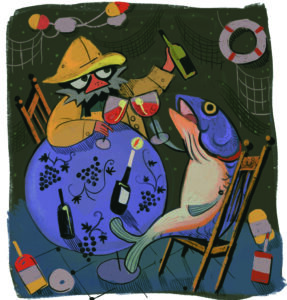Nova Scotia Premier Tim Houston recently announced a commercial wine subsidy program. Currently, local wineries are eligible for a subsidy to help with the costs of selling their product. With this new plan announced, the same subsidy will apply to commercial bottling companies even if they buy grapes outside of Nova Scotia or Canada. Local wineries are concerned about what the implications of this will be.
Right now, there are just two commercial bottling industries in the province, Devonian Coast and Peller Estates. The concern starts with the differences in how wine is made. While local businesses grow all their products for sale, Devonian and Peller can afford to buy grapes from abroad and supplement their grown stock with international products. This is something that local businesses do not have the privilege of and prefer not to do. With this subsidy, Devonian and Peller will receive six to 12 million dollars annually.
Local wineries are concerned that this amount of money will add incentive to purchase cheaper grapes from out of Canada. This is worrisome because, in the past, these two industries did not have a smart financial reason to purchase grapes abroad, however, with this subsidy, it is cheaper to buy grapes from abroad. CEO of the winery Domaine de Grand Pré, Beatrice Stutz, expressed her concern in an interview with CBC saying: “The biggest issue for me, or for us as an association of farm wineries, is that the Nova Scotia taxpayers’ money will subsidize the foreign grape production by incentivizing the bottling of imported grape juice in Nova Scotia.”

Another issue is that this will only be a nuisance to the local wine industry. Instead of having the local wine industry continue its economic successes, Stutz worries that the subsidy will only benefit Devonian and Peller, which could drive local wineries out of business. “This program only benefits two players, but it undermines all the farm wineries and the over 100 grape growers that are in this province,” said Stutz. Over the past decade, the wine industry has built itself to become one of the most successful sectors for Nova Scotia providing 250 million dollars annually for the local economy as well as 1,100 jobs province-wide. Subsidizing commercial bottlers poses a threat to these local businesses as Devonian and Peller will have the privilege to buy cheaper products and charge far less than local businesses.
Pushback has also received support from the federal government as well. Member of Parliament for Kings-Hants Kody Blois voiced his opposition to the subsidy program in a letter to Premier Houston, saying: “The policy as proposed would eliminate a long-standing focus on the development of the Nova Scotia grape industry,” Blois said, “the proposed financial incentive from your government would give an equal benefit to those who bottle wine in Nova Scotia, regardless of whether they have any grape production or ties to the province.” Criticism was also shown by the Nova Scotia Federation of Agriculture, who, in a statement said: “While we wholeheartedly support initiatives aimed at supporting Nova Scotia businesses, we fear that the current trajectory of the [program] may inadvertently undermine the goals of increasing the production of local agricultural products and pose a significant threat to our farm wineries.”
After Karl Coutinho, President of Wine Growers Nova Scotia called the program “catastrophic,” the President of Peller Estates, John Peller, seemed confused about Coutinho’s concern in an interview with CBC. “I think that reference is hard for me to comprehend,” said Peller, “that would be like them saying that investment in the cider industry [is] threatening to them. In fact, [I am] the living proof that investing in all aspects of the wine industry, both the value and the premium, is good for the entire industry.” Peller’s winery in Truro can make 400,000 cases of wine and cider annually. While Peller says that his company uses 2.8 million pounds of Nova Scotian apples for its cider each year, the concern is still about the effects of incentivizing the use of foreign grapes.
Why this program is occurring despite significant progress made by the wine industry is debated. While Nova Scotia’s finance minister says it was made to be compliant with international trade laws, the Liberal Party of Nova Scotia claims that the premier was influenced by the owner of Devonian Coast, who not only donated to Houston’s 2021 campaign but also attended a New Year’s Eve party with him.
The effects that this will have on the local industry have not yet been seen, however, the foreboding feelings held by wineries, wine associations, and governments are worrisome for the local economy.





